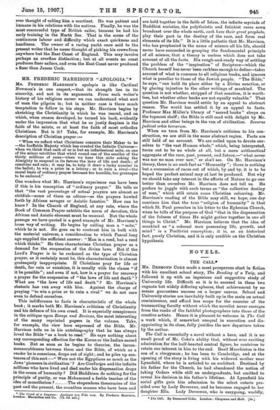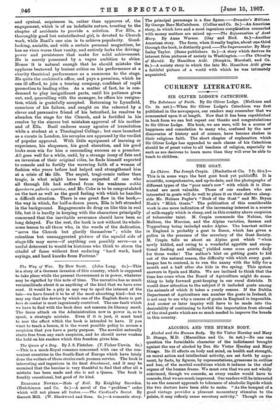NOVELS.
THE CALL.*
MR. DESMOND COKE made a most prosperous start in fiction with his excellent school story, The Bending of a Twig, and followed it up with an ingenious and suggestive study of University life. Difficult as it is to succeed in these two cognate but widely differing spheres, that achievement by no means guarantees success on a larger canvas. School and University stories are inevitably built up in the main on actual reminiscence, and afford less scope for the exercise of the transmuting faculty without which the novelist never emerges from the ranks of the faithful photographers into those of the creative artists. Hence it is pleasant to welcome in The Call a work which, if somewhat unequal in execution and dis- appointing in its close, fully justifies the new departure taken by the author.
The Call is essentially a novel without a hero, and it is no small proof of Mr. Coke's ability that, without ever exciting admiration for the half-hearted central figure, he contrives to retain our interest in him to the end. Basil Murchiston is the son of a clergyman ; he has been to Cambridge, and at the opening of the story is living with his widowed mother near Lynnfield, where he is articled to an architect. Destined by his father, for the Church, he had abandoned the notion of taking Orden while still an undergraduate, but omitted to reveal his decision in his father's lifetime. At Lynnfield his social gifts gain him admission to the select coterie pre- sided over by Lady Devereux, and he becomes engaged to her daughter Ella. Lady Devereux, who is easygoing, worldly,
• Ike Call. By Desmond Coke, London: Chapman and MalL [135.1
and cynical, acquiesces in, rather than approves of, the engagement, which is of an indefinite nature, trusting to the chapter of accidents to provide a solution. For Ella, a thoroughly good but unintellectual girl, is devoted to Church work, while Basil's one aim is to achieve popularity. Good- looking, amiable, and with a certain personal magnetism, he has no vices worse than vanity, and entirely lacks the driving. power and persistence that make for solid achievement. He is merely possessed by a vague ambition to shine. Hence it is natural enough that he should mistake the applause bestowed by lenient critics on his performance at a charity theatrical performance as a summons to the stage. He quits the architect's office, and pays a premium, which he can ill afford, to join a touring company, confident of rapid promotion to leading roles. As a matter of fact, he is con- demned to play insignificant parts, until his patience gives out, and, quarrelling with the manager, he offers his resigna- tion, which is gratefully accepted. Returning to Lynnfield, conscious of his failure, and caught on the rebound by a clever and persuasive friend of his betrothed, he resolves to abandon the stage for the Church, and is fortified in his resolve by the sincere but mistaken approval of his mother and of Ella. Basil endures many agonies of irresolution while a student at a Theological College ; but once launched as a curate in London, his scruples are appeased by the verdict of popular approval. With little equipment of learning or experience, his eloquence, his good elocution, and his good looks soon win for him a resounding success as a preacher. All goes well for a while, until, by a strange irony of fate and an inversion of their original idles, he finds himself expected to console and to fortify the wavering faith of a woman of fashion who years before bad helped and strengthened hiss at a crisis of his life. The sequel, tragi-comic rather than tragic, is what might have been expected of one who all through life had suffered from the weakness eroAArl ibpoviovra imaevOs cpariew, and Mr. Coke is to be congratulated on the tact as well as the good feeling with which he handles a difficult situation. There is one great flaw in the book,— the way in which, for half-a-dozen years, Ella is left stranded in the background. Engagements do drag on like this in real life, but it is hardly in keeping with the characters principally concerned that the inevitable severance should have been so long delayed. For the rest, the book is not without its whole- some lesson to all those who, in the words of the dedication, "serve the Church but glorify themselves " ; while the relentless but unexaggerated picture of the squalid side of stage-life may serve—if anything can possibly serve—as a useful deterrent to would-be histrions who think to storm the citadel of fame without first enduring "hard work, hard sayings, and hard knocks from Fortune."







































 Previous page
Previous page